October 3, 1962: Giants @ Dodgers
The date was September 20, 1962.
- The San Francisco Giants were finishing up a two-game series in St. Louis. The day before, Al Dark's club had defeated the Cardinals to end a six-game losing streak that dropped them four games behind the Los Angeles Dodgers in the NL pennant race. The losing streak had followed a 9-1 stretch that pulled the Giants within a half-game of the hated Dodgers.
Giants OF Felipe Alou recalled, With only nine games left in the season, I think most of us believed it was over. I'll admit I thought it was. A lot of us - including me - already sent our families home in preparation for the offseason.
- As luck would have it, the Dodgers arrived in St. Louis that day to play a three-game weekend series with the Cards and crossed paths with the Giants in the hotel.
- Alou: In the hotel lobby in St. Louis some of us ran into Dodgers relief pitcher Ron Perranoski, and he jokingly said to me, "You might as well go home to the Dominican Republic. We have this pennant race sewed up." Tommy Davis, a good guy and a great hitter for the Dodgers, echoed the same thought. “I guess we’ll see you guys next year,” he said. It was a friendship statement, not a dig. Not disrespectful. I don’t know whether Perranoski’s and Davis’s words reached Alvin Dark’s ears, but what I do know is we lost to the Cardinals in a walk-off that night and Dark called a team meeting the next day in Houston. “Guys,” he said, “we have a chance to win this.” I don’t think anyone believed him. He added that we were also going to conduct team practices every day before our games. That didn’t go over well. A lot of us thought it was a punishment.
The story throughout the Dodgers' 1962 season was Maury Wills's quest to break one of baseball's hallowed records - Ty Cobb's 96 steals in 1915.
- Maury's goal for '62 was to steal 50 bases - the same number he had swiped to set a Dodgers' record in 1960. But when he reached that mark July 27, he set his sights on twice that.
- Buoyed by the Dodger Stadium crowd chanting "Go! Go!" every time he got on base, Wills reached 82 on September 7 for a new NL record. Exhausted and suffering from a pulled hamstring and internal bleeding in his right leg from the constant pounding, Maury got #96 and 97 September 23.
- He finished the regular season with 100 thefts.
Whether it was the daily practices or something else, the Giants woke up.
- They won six of their last nine, which isn't great. But the Dodgers stumbled to a 2-7 finish, including dropping five of six to the 6th-place Cardinals the last two weekends. Altogether, LA had lost 10 of its last 13.
- As a result, both California teams ended the season 101-61.
The manager of the 1951 Giants, Leo Durocher, was now the third base coach on Walt "Smoky" Alston's Dodger staff. Not good at playing second fiddle, Leo considered Alston to be too conservative a manager who failed to utilize the talents of one of the best teams I had ever been associated with (as he put it in his 1975 autobiography). Leo openly criticized Alston's decisions in the dugout and the locker room. Seven key players having the best seasons of their career, and we couldn't shake the Giants. Three guys who could run like ring-tailed apes, and we had a manager who sat back and played everything conservatively. Forget the signs. Speed overcomes everything. Let them run.
After Koufax went out, I just thought, To hell with it. Alston would give me the take sign, I'd flash the hit sign. Alston would signal to bunt, I'd call for the hit-and-run. I never "saw" a take sign from Alston with any of the speedsters - and they loved it. The whole team knew what I was doing, and they were saying, "Just keep going, Leo. ... It was always played tight to the vest around here before but now, Christ, we're playing wide open."
Alston finally called a meeting and said, As of tonight ... I will take complete charge of this ball club. And Leo, that means you. If I give you the bunt sign, that's what I want. ... And if I give you the take sign, I want that hitter to take. Any sign that I give and you miss, I will fine you $200 and the player at bat $200.
Leo laid the blame for the Dodgers' swoon the last weeks of the '62 season solely at Alston's feet. He took the bats right out of their hands and, brother, their assholes tightened so that you couldn't drive a needle up there ... and the tighter they got the more conservative he became. And every day he held a meeting, which is the worst thing you can do when a team is going very bad or very good. ... With three games left we were two ahead. All we had to do was win one of them. We lost all three. With a team like that, it was criminal.
So the National League scheduled the fourth best-of-three playoff in its history.
- Amazingly, the Dodgers were involved in all three previous playoffs, first in Brooklyn in 1946 and 1951, then in Los Angeles in 1959.
- The New York Giants had been the opposition in the famous 1951 playoff that ended with Bobby Thomson's walkoff home run.
When the '62 season ended in a tie, Duke Snider, the only Dodger player who had been in the '51 playoff, said, We owe the Giants something. (Coach Leo Durocher had managed the Giants in '51.)
Willie Mays was the only current Giant player who participated in the '51 playoff. Manager Dark was the SS and captain on that team.
- The Dodgers won the coin flip to determine where the games would be played and chose to start in San Francisco Monday, October 1, followed by games in Los Angeles the next two days. All contest would be played in the afternoon.
Los Angeles manager Walt Alston took a chance by starting Sandy Koufax in Game One.
- The southpaw had been beset by a numbness in the index finger on his left hand that eventually spread to the entire hand. Shut down after a disastrous start July 17, he started three games in late September and lost them all, lasting only 7 2/3 innings combined.
- Sandy would do no better in Game One. He pitched only one inning, giving up four hits and three runs as the Giants coasted 8-0 behind Billy Pierce.
It was the Giants' seventh win in their last eight meetings with the Dodgers. Dark incurred the wrath of the Dodgers by ordering the Candlestick Park grounds crew to soak the base paths to slow down Wills. Alerted by the Dodgers, umpire Jocko Conlan ordered the field repaired, although it was still mushy at game time. Maury said after the 8-0 loss: If the Giants wanted to shake us up, they couldn't have picked a better way to do it. We were really demoralized. It even affected our hitting because we were so angry over the mud that we couldn't concentrate properly at the plate.
The Dodgers' prospects didn't look that great the next afternoon when the Giants scored four in the top of the sixth to take a 5-0 lead behind their ace Jack Sanford - especially since LA had been shutout for 35 consecutive innings.
- When Sanford walked Jim Gilliam to start the bottom of the inning, Dark brought in Stu Miller. That opened the door to a seven-run inning for the Dodgers.
Sanford suffered from the flu, which explained Dark's decision to remove him so early.
- But the Giants tied the game with two runs, one of them unearned, in the top of the 8th.
- The bottom of the 9th started with a walk to Maury Wills, who had broken one of baseball's most revered records - Ty Cobb's 96 stolen bases in 1915. To minimize the runner's chance of stealing, Dark brought in lefty reliever Dick LeMay. But worried about keeping Wills close, LeMay walked Jim Gilliam.
- Rookie reliever Gaylord Perry fielded Daryl Spencer's bunt and appeared to have a play at third but, ignoring his catcher's call, threw to first as the runners moved to second and third. That forced Dark to intentionally walk Tommy Davis.
- Ron Fairly prolonged LA's season with a liner to center field that was deep enough to score Wills with the winning run and end the longest nine-inning game in NL history to that point - four hours and 18 minutes.
Fairly had been in a dreadful slump - only one hit in his last 31 times at bat.
One manager announced his Game Three starter immediately but the other demurred..
After a disappointing attendance of 25,321 for the Tuesday game, almost twice that number, 45,693, showed up on a sunny but muggy Southern California day with smog hanging over the park to see who earned the right to meet the Yankees in the World Series.
Among the celebrities in attendance for Game Three were actresses Doris Day and Rosalind Russell, singer-actor Frank Sinatra, and former Vice-President Richard Nixon, who was running for governor of California.
|
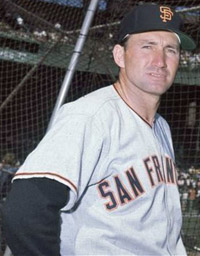 Alvin Dark
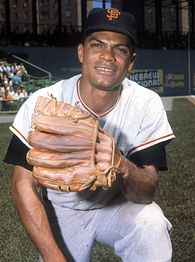
Felipe Alou
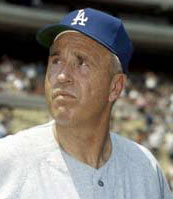
Walter Alston
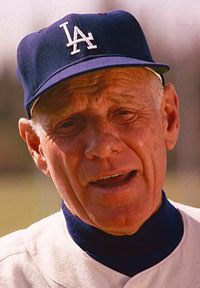
Leo Durocher
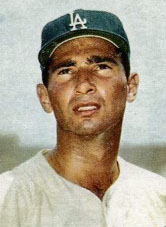
Sandy Koufax
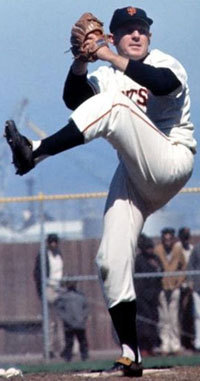
Jack Sanford
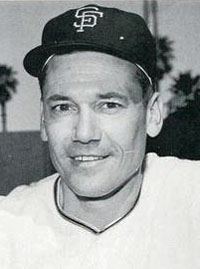
Stu Miller
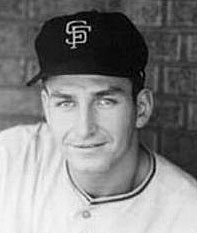
Dick LeMay
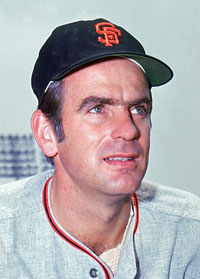
Gaylord Perry
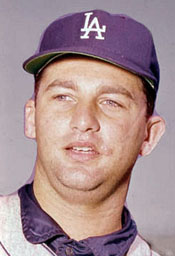 Larry Sherry
|
Starting Lineups
Batting Averages at game time
San Francisco Giants
| Harvey Kuenn |
LF |
.303 |
| Chuck Hiller |
2B |
.275 |
| Felipe Alou |
RF |
.316 |
| Willie Mays |
CF |
.304 |
| Orlando Cepeda |
1B |
.306 |
| Ed Bailey |
C |
.228 |
| Jim Davenport |
3B |
.297 |
| Jose Pagan |
SS |
.257 |
| Juan Marichal |
P |
18-11 |
|
 |
 |
Los Angeles Dodgers
| Maury Wills |
SS |
.296 |
| Jim Gilliam |
2B |
.273 |
| Duke Snider |
LF |
.271 |
| Tommy Davis |
3B |
.344 |
| Wally Moon |
1B |
.245 |
| Frank Howard |
RF |
.299 |
| John Roseboro |
C |
.251 |
| Willie Davis |
CF |
.286 |
| Johnny Podres |
P |
15-13 |
|
|
First Inning
Second Inning
Third Inning
Fourth Inning
- Bailey lined to Gilliam.
Davenport fouled the first pitch to Moon up against the stands.
But Podres was denied another three-up-three-down inning when both Pagan and Marichal belted singles to left field.
Then Johnny finally retired Kuehn, who fouled to Roseboro.
- Snider smacked a low liner that skipped away from Alou into the corner for a double.
With the crowd doing its best to inspire their heroes, Tommy Davis lined a single to left field, the Duke holding at third .
Dark talked to his young pitcher and instructed his infield to play at double play depth.
Moon flew to Alou near the right field line. With none out, Snider held third.
Howard bounced a 3-2 pitch to Davenport cutting in front of the shortstop. Jim threw to second for the forceout, but Davis barreled into Hiller, causing a weak throw too late to first base. That allowed Snider to score LA's first run.
The trainer ministered to Hiller, who was spiked on one foot. Chuck after the game: I knew he was going to take me out, but I didn't care. ... I just had to try for that relay to first. Sure, I thought I was through for the series and everything the way my foot was bleeding after I was spiked by Tommy Davis ... But trainer Frank Bowman did the necessary repair job, and I went back to work.
Roseboro was caught looking on a curve.
GIANTS 2 DODGERS 1
Fifth Inning
- Hiller skied the first pitch to Moon.
Snider showed some of his old form by hurrying in to grab Alou's short fly.
Tommy Davis caught Mays's popup near the mound.
- In a replay of the bottom of the second, Willie Davis lined to Alou in on the warning track in front of the 375' sign, and Podres stuck out swinging.
Then Wills, coming up with two outs and nobody on again, lined his third single of the afternoon.
But Gilliam hit the first pitch to Mays.
Sixth Inning
- Cepeda drilled the first pitch to the opposite field for a base hit.
Ed Roebuck began warming in the LA bullpen.
Dark called for a hit-and-run on the first pitch, but Bailey fouled the ball. Then Ed hit a grounder up the middle that Wills knocked down to keep Cepeda from heading to third. Runners on first and second with no out.
NBC Radio kept interrupting Al Helfer and George Kell's broadcast of the game to report on Commander Wally Schirra's space flight until his safe rescue in the Pacific.
Davenport laid down a perfect bunt that turned into a single down the third base line to load the bases.
Right-handed sidearmer Roebuck, age 30, made his 65th appearance of the season and his sixth in the last seven days. Podres received a warm ovation as he left the mound.
With the infield in, Pagan grounded to Wills who got the force at home.
Then Marichal bounced up the middle to Maury, who stepped on second and threw to first base for the double play.
- The scoreboard flashed CHARGE in lights 18' high to incite the crowd and inspire a productive inning with the 3-4-5 batters coming up.
Snider fell behind 0-2 before lining a single to left field.
Marichal pitched himself into a 3-0 hole, not a good place to be against the league's top batter. After taking a strike, Tommy Davis clouted his 27th home run over the left-center field wall to put the Dodgers ahead by a run and create pandemonium in the stands.
Moon lined to Kuenn in left field.
Howard reached first base on a high throw by Pagan from deep shortstop.
Dark argued with Frank Donatelli, the first base umpire, that Cepeda tagged the runner after leaping for the throw. Meanwhile,
the Giants bullpen sprang into action.
Alou came on strong to take Roseboro's short fly.
Willie Davis lined to Cepeda, who made a leaping catch.
DODGERS 3 GIANTS 2
Seventh Inning
- Roebuck could be rewarded with the victory after pitching out of the bases-loaded-no-out jam in the sixth.
Gilliam moved to third base, Tommy Davis moved to left field, and 2B Larry
Burright slid into Snider's batting spot. Burright would play a significant role in the outcome of the game.
After Kuenn flew to center field, Hiller doubled down the left field line.
Alou bounced out 6-3 as the runner held second.
With Stan Williams and Ron Perranoski throwing in the bullpen, Alston visited the mound but stuck with Roebuck.
The Dodgers gave Mays an intentional walk.
The strategy worked as Cepeda rapped the first pitch on one hop to Burright, who flipped to Wills for the forceout.
- The home team added a run to their lead thanks to the all-time leading basestealer.
Hitting from himself, Roebuck fouled to Cepeda.
Wills kept his perfect day going with another line single to left-center field.
For some reason, Cepeda was playing three steps off the bag and in front of the runner. So Wills took off on the first pitch and easily stole base #103.
Gilliam flew to left field.
With Burright at the plate, Wills raced to third on the first pitch and continued home on the wild throw by Bailey.
The batter then popped to third.
DODGERS 4 GIANTS 2
Felipe Alou: It was that tack-on run in the seventh inning that especially bothered me, because of the way the Dodgers' third base coach, Leo Durocher, acted when they scored it. ... Durocher ran all the way down the line with him (Wills) and slid as Wills slid home safely. Thinking they had the game won, Durocher got up laughing, like it was a show, a joke. I never wanted to win a game as badly as I did that game.
Eighth Inning
- Ron Fairly replaced Moon at first base.
Bailey lined a single to right field.
Roebuck's sinker ball worked again as Davenport hit into a 6-4-3 twin killing.
Pagan lined to second base.
Durocher claimed he asked Roebuck, How do you feel, buddy? as Ed left the mound after the top of the 8th. He said, "My arm feels like lead. Man, I am tired." I didn't go to Alston. I went to the pitching coach, Joe Becker, who was standing practically alongside him at the corner of the dugout. ... "Get somebody ready," I said to Becker. "Don't let this fellow go out in the ninth inning. He can't lift his arm." Becker didn't say a word. Alston didn't say a word. It was like I wasn't there. I said, "Walt, he told me he was tired. He's through." And Alston said, more to Becker than to me, "I'm going to win or lose with Roebuck. He stays right there."
- In a move that astounds us in the 21st century, Marichal returned to the mound to face Tommy Davis. But after he threw three straight balls, Dark finally made a pitching change, bringing in Don Larsen. He promptly completed the base on balls, which was charged to Marichal.
Fairly sacrificed 1-4 to move Davis to second.
When the count reached 3-2 on Howard, Davis stole third as Frank swung and missed the high outside pitch.
Dark ordered intentional passes to both Roseboro and Willie Davis.
That set up another astounding decision by Alston. With the bases loaded and a chance to put the game away, he let Roebuck hit for himself. Ed got his bat on the ball, a 5-3 groundout to keep the score 4-2.
Alston explained afterward his decision to let Roebuck hit. Ed's a pretty fair hitter, and he was the man I wanted in there to protect the two-run lead in the ninth.
Felipe Alou: When I came off the field after the bottom of the eighth ... I went straight to the clubhouse and did something I've never done before or since - I prayed for us to win. I felt I needed a quick connection with Jehovah God, a few seconds to visit with him before going into combat.
Durocher: When I came back in (after the bottom of the 8th) and took my seat at the other end of the bench, Drysdale, Koufax, and Johnny Podres ... were standing right there. "Don't let them send Roebuck back out," they pleaded. "Tell him he's got make a change. Don't let him do it, Leo." Don't let him? "What the hell do you want me to do, I'm not managing the club. There's not a goddamn thing more I can say that I've said.
The only left-handed hitter remaining on Alston's bench was Tim Harkness, who hit .258 that year and would enter the game in the 9th inning as a defensive replacement at first base.
Ninth Inning
- Having pitched 3 1/3 innings after hurling four innings in the 8-0 rout in Game One, Roebuck did not justify Alston's faith in him.
Roebuck: The tirerder I got, the more the ball sunk, which is probably one of the reasons why Walt didn't take me out of the game. But I was really beat. It was the most uncomfortable I've ever felt in a game. The smog was just hanging in the park, it was hot, and I was thinking how happy I was going to be when this thing was over.
Tim Harkness took over at first base, Fairly moving to right field to replace Howard.
Dark didn't offer his club any inspiring words in the dugout. He simply told the younger Alou, Matty, get your bat.
Matty Alou, Felipe's younger brother, hit for Larsen and singled to right field. That immediately brought the tying run to the plate.
Kuenn grounded to SS. Wills threw to second for the force, but Harvey beat the throw to first.
Willie McCovey hit for Hiller and drew a walk on four pitches. Ernie Bowman ran for McCovey.
Ron Fairly: Kuenn ... hits a perfect double-play ball, a one hop to Wills. But unfortunately somebody had moved Larry Burright, our second baseman. They moved him over toward first base. If he's playing a normal second base, we turn the double play and Kuenn is out by ten feet.
Roebuck: The ball is hit to Maury, but he has to wait for Burright to get to the bag. The throw finally got there and Larry made a hell of a pivot, but too much time had elapsed and Kuenn beat the relay at first.
Larry Sherry: Everybody was screaming, "Who moved Burright?" Because we knew it was either Alston or Durocher. But nobody ever took the blame for it.
Roebuck continued to struggle, walking Felipe Alou on a full count to load the bases.
Roebuck: Alston came out to the mound and asked me if I felt okay, and I just said that I wanted to finish this thing one way or the other. That particular year, I'd had pretty good luck against Willie. (1-for-7 in '62)
Mays slapped the first pitch, a sinker down and in, off Roebuck's glove for a single to move everyone up one base, Matty Alou crossing the plate.
Decades later, Ed recalled: I'm thinking I just want to get a groundball and hope he (Mays) hits it at somebody. Somehow, he hits my inside pitch back up the middle, which is a very tough thing to do. This white blur was coming right at me. I had one of these huge gloves on ... The ball hit in the web and f it had been a smaller glove, it probably would have stuck there and I could've gotten as many outs as a I wanted. But it rolled out on the grass and was sitting there spinning while a run scored. I knew we were in big trouble then. So Walter took me out ...
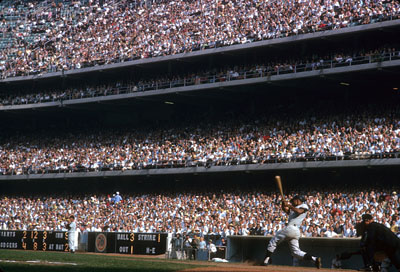
Mays smashes single off Roebuck. Durocher: Walt called me over from the other side of the dugout to make a pitching change. When I got to the bat rack, he said, "Bring in Williams."
I put one foot up on the bench and I hollered back, "What? Did I hear you right? You're bringing in Williams?"
"That's what I said, Williams." ...
I went out and I brought in Williams, and then I said to the boys on the bench, "We may as well go in. If I had ten pitchers, this would be the tenth one I'd bring into a spot like this. He'll walk the ball park."
Williams was a hard-throwing right hander who led the Dodgers in walks with 98 against 108 Ks. Roebuck said later, I was surprised to see Stanley coming in (instead of Perranoski).
As Williams was leaving the bullpen, lefty Perranoski said to him, You get Cepeda, and I'll get Bailey (the left-handed batter behind Cepeda).
Roseboro: We all worried about Williams. He was wild and inconsistent. On Alston's orders, Durocher came out to the mound to make the change, and while we waited for Williams, Durocher said to me, "He'll walk the ballpark." I said, "He'll be okay." I wanted him to be.
Cepeda had been embarrassed twice earlier in the day. In the third, Mays was purposely walked to get to Cepeda and, with the bases loaded, Orlando hit into a DP. In the 7th, Mays was again passed intentionally, and the Giants first baseman hit into an inning-ending forceout. Hit into another bases-loaded DP now and wear the goat's horns for the rest of his life. Stan buzzed a fastball past Cepeda. But Orlando got hold of the next one for a sacrifice fly to right field, Bowman scoring the tying run and Felipe Alou moving to third.
Williams: So now there's two outs, it's 4-4 and the only right-handed hitter they've got left is John Orsino, a kid who they weren't going to use in that situation. So that means Bailey, a left-hander, is next. I figure that's it for me - Ronnie will be pitching to him - so I started walking to the dugout, then looked up and saw Alston wasn't coming.
With the count 0-1 on Bailey, Williams threw a pitch that got away from Roseboro. Alou held third, but Mays took second. With first base open, the Dodgers completed the walk to Bailey to load the bases for the third time in the inning.
Roseboro: Trying to throw one by Ed Bailey, Williams threw into the dirt. I made one of the better blocks of my career and kept the runner at third, but the runner on first went to second. ... Alston decided to give Bailey an intentional walk to load the bases and set up the force play at any base. This was quite a burden to load on the wild Williams, and he got too careful pitching to Jimmy Davenport ...
Durocher: Alston ordered an intentional pass to load the bases again. Nobody on the bench said a word. Nobody had to. The same thought was on everybody's mind. He's loading the bases with Williams pitching, and right after Williams has shown that he hasn't got his control.
With a chance to get out of the inning with the score tied, Williams walked Davenport on five pitches to force in the go-ahead run.
Williams: It (walking Davenport) never bothered me that much because I gave it all I had and it didn't work out. Had I let up and thrown a half-assed fastball and the guy had gotten a base hit, I never would have forgiven myself. But I walked him at 100 mph, giving my best shot.
Finally, Alston sent Durocher to the hill to call for southpaw Ron Perranoski, who led the Dodgers in saves with 19.
Saves were not yet computed in 1962 but have been retroactively calculated. Perranoski, however, had not pitched well down the stretch. He'd given up 22 hits and 13 runs in 11 innings in his last eight appearances. That could have been a reason why Alston was reluctant to bring him in, although Smoky never explained his decisions in this game - not even in two autobiographies.
Pagan smacked Perranoski's first pitch foul down the left field line.
Then the Dodgers got exactly what they wanted from Perranoski, a ground ball to end the inning. But 24-year-old rookie second base Burright bobbled the ball. Mays scored and the bases remained loaded.
Bob Nieman pinch hit for Matty Alou and
struck out to end the Inning from Hell for the Dodgers. The visitors had scored four runs on only two hits thanks to four walks, a wild pitch, and two errors. GIANTS 6 DODGERS 4
Durocher: Worst inning I ever saw in my life.
Years later, Roebuck recalled: Jesus, I was tired. I just wanted to get it over with. It seemed like the season was endless.
- Southpaw Billy Pierce, who twirled the shut out in Game One, came in to nail down the pennant. Pinch-runner Bowman stayed in the game at second base.
Pierce: With a two-run lead ... I wasn't about to walk anyone. They had to come to us then, so I just threw high sliders right over the plate.
The Dodgers had the ideal part of their lineup coming to bat, starting with Wills, who was 4-for-4.
With the fans yelling "Charge," Maury fell into an 0-2 hole before hitting a slow roller to Davenport who threw to first to retire the speedy SS for the first time.
Gilliam, like Wills, hit right handed for the first time all day. Pierce got ahead of Jim also, 1-2, before inducing an easy fly to Mays.
Lee Walls, the hero of Game Two with his bases-clearing double in the seven-run 6th, hit for Burright. Lee whacked Pierce's third pitch to right-center field. For a fleeting moment, Dodger fans thought the ball might drop, but it hung up for Mays, who threw the horsehide into the stands in jubilation.
FINAL SCORE: GIANTS 6 DODGERS 4
2B Chuck Hiller afterward: I just can't believe it. I have to stand out there and do nothing while Willie Mays catches the ball. But all of the time I am thinking, "Is this really going to happen?"
Felipe Alou: I ran in from right field, jubilant, celebrating with my teammates. At the same time I caught sight of some of the Dodger players, forlorn, heads bowed, a few showing tears. As I did with Koufax, I felt sorry for them. For us, though, it was pandemonium again in the clubhouse. I found another quiet spot, this time in the shower area, and bowed in another prayer. I emerged to see someone offer Alvin Dark a paper cup filled with champagne.
"No, thanks," he said. "I don't need any help to be happy at a time like this."
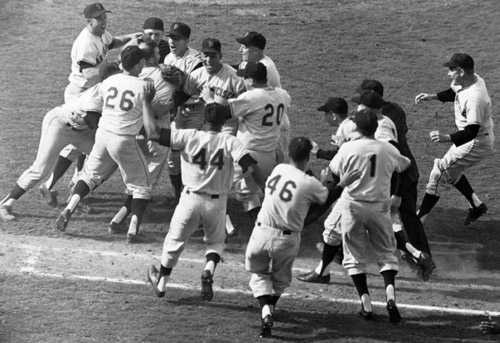
Giants rejoice after winning NL title.
|
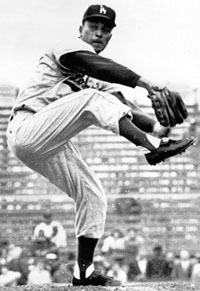 Johnny Podres
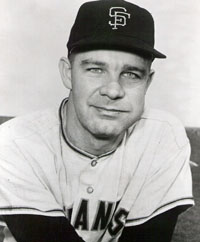
Harvey Kuenn
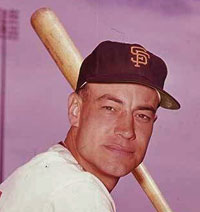
Chuck Hiller
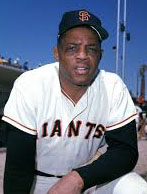
Willie Mays
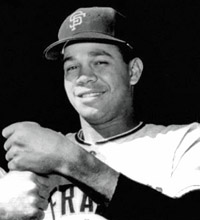
Juan Marichal
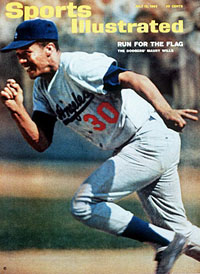
Maury Wills
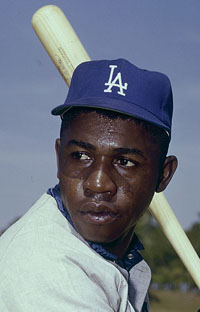
Jim Gilliam
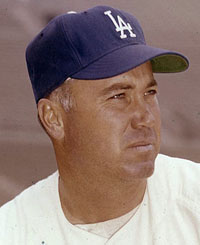
Duke Snider
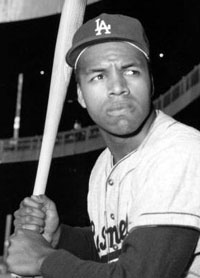
Tommy Davis
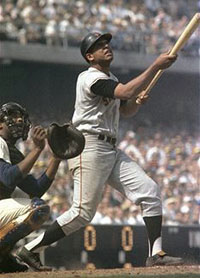 Orlando Cepeda
Orlando Cepeda
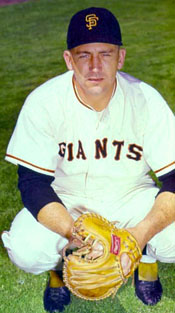
Ed Bailey
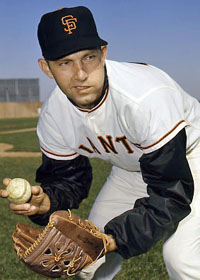
Jim Davenport
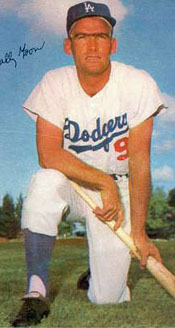
Wally Moon
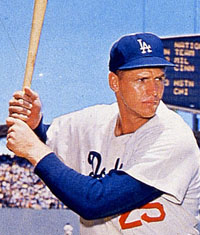
Frank Howard
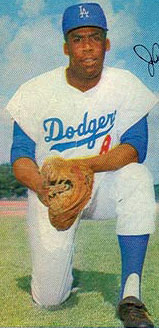
Johnny Roseboro
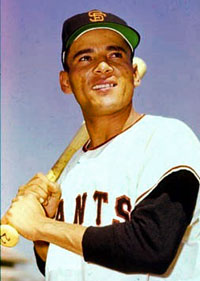
Jose Pagan
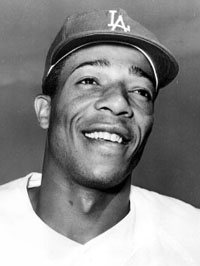
Willie Davis
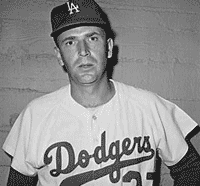
Ed Roebuck
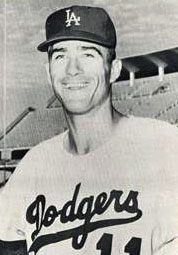
Larry Burright
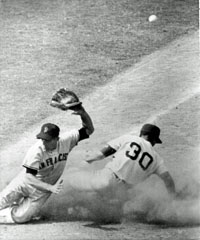
Wills steals 3B and scores
on wild throw in 7th.
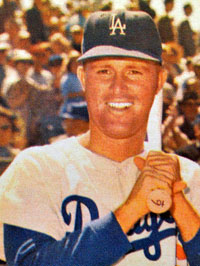
Ron Fairly
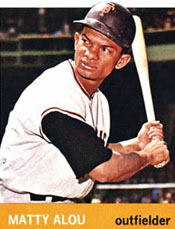
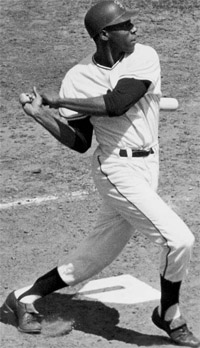
Willie McCovey
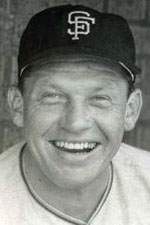
Bob Nieman
|
Postgame
Giants Clubhouse
- Alvin Dark told reporters that he had a feeling from early September that his club would win the pennant. We beat the Dodgers three out of four in Chavez Ravine, and that convinced me we had a club which could do the job. In fact, to me it was the turning point of the season. ... We had to make up our minds to play everyone we had to in order to win. ... The players are entitled to all the credit, and it was not just a one man job. ...
Walt Alston entered the champagne-fueled Giants madhouse to congratulate Dark. Go get 'em. We'll be with you in the Series, said the Dodger skipper. Dark replied, I'm sorry what happened to Koufax. That made the difference.
Former Vice President Richard Nixon, who was running for governor of California, visited the clubhouse to congratulate the Giants. An avid baseball fan, Nixon told Pierce he remembered Billy's near-perfect game for the White Sox in Washington in 1957. The former veep greeted most of the players by name but was stumped when the Giants SS shook his hand. I'm Jose Pagan. I am happy you are here.
- Mays admitted I never thought we'd come back to win ... never in a million years. With two runs down in the ninth, who would give a nickel for our chances? Honestly, I never thought we'd do it. This is my third World Series, and the other two were nothing compared to this one.
- Nearby, Harvey Kuenn said, I agree with Willie, but we started to have some hope fter the first man up (pinch-hitter Matty Alou) got on in the ninth.
- Giants coach Wes Westrum, C on the '51 champs: For impact, you'll never beat 1951. But I'll tell you this. This is a better Giant team. These guys are real tigers.
- Noticing the amount of champagne in the clubhouse, Ed Bailey said, If we drank all this stuff, we'd be sick for a week. And if we had blown that game today, we'd have been sick for a year.
Back home in the San Francisco financial district, people threw ticker tape and torn up telephone books from office buildings. Cable cars clanged, horns blared. Market Street was jammed until long past midnight.
Dodgers Clubhouse
- The Dodger dressing room was locked tight for more than 35 minutes after the game as players smashed beer bottles, ripped their uniforms, cursed Alston, and wept. Podres went so far as to accuse the manager of stealing their World Series money. (Some say it was Tommy Davis, not Podres.) Someone passed bottles of whiskey to players, some of whom got drunk fast and fell to the ground.
Durocher: The players told the clubhouse man to lock the door, and while Alston was over in the San Francisco dressing room congratulating Dark, something happened that I had never seen in any clubhouse or ever expected to see. Where they came from I will never know, but whiskey bottles were handed around to the players. ... they sat there, stunned. Except for an occasional shouted curse, nobody said anything. They sat ... in their sweaty uniforms and tried to get themselves drunk.
John Roseboro recalled: I don't like to be around drunks. So I got dressed and left. It was the worst scene I ever saw with the Dodgers.
- During that time, veterans Snider and Moon emerged to tell newsmen, Give the boys a little time to cool off. They've just blown about $12,000. They feel real bad. They're still in a daze. When reporters finally entered, they found most of the players sitting in silence and shock. Johnny Podres had obviously been crying.
- Walt Alston, who was rumored to be in a shaky position as far as returning as manager even before Game Three, received a call from club president Walter F. O'Malley and GM Buzzie Bavasi. Publicist Red Patterson explained, They told him to relax. They told him it was a long season but that's baseball. Alston reportedly received the message with tears in his eyes.
In his 1987 autobiography, Bavasi said he was authorized to fire Alston after the 1962 season but decided not to do so. It proved to be the right decision as the Dodgers won the NL pennant in 1963, 1965, and 1966.
- When the LA manager finally addressed the press, he didn't offer any excuses. We had many opportunities, but we just could not take advantage of them. The club did its best. With a healthy Sandy Koufax, we might have proven ourselves a bit tougher through the stretch. Alston also said, The hitting slump we went into the last two weeks of the season was one of the primary things (in blowing the lead). ... In the last couple of weeks, our lack of ability to get runs cost us the most. When we did get a few runs, the pitching wouldn't be good enough. We couldn't put the two together. ... When we used our best defensive lineup, we didn't have our best hitting in there. Walt said of Ed Roebuck, He did a helluva job as long as he lasted. It's not like him to walk hitters the way he did there in the last inning.
- Duke Snider recalled the gut-wrenching loss in the three-game playoff against the Giants eleven years earlier. I was in a daze after the 1951 playoff. I didn't really come to until I was driving home in my car. Then, when I realized what had happened, I said to myself, "At least I won't have to go through this again."
That evening, what was supposed to have been a Dodger victory celebration was held at a Sunset Strip restaurant. O'Malley, Bavasi, and Alston were not present.
Durocher: I was called over to the big table where most of the Dodger officials were seated ... While we were commiserating with each other, someone at the table said to me, "If you'd have been managing the ball club, we'd have won it.
I just looked this man right in the eye and I said, "Maybe." And then I said, "I know one thing. I'd have liked to go into the ninth inning with a two-run lead. I'd take my chances." Period. End of quote.
That's all I said. ... It didn't come out that way in the newspapers, though. The way the papers had it, I had publicly second-guessed Alston. The way the newspapers had it, I had said that if I had been the manager we'd have won the pennant.
Bavasi told Leo the next day that if the reports were true, he was fired. When Durocher insisted he had been misquoted, Buzzy launched an investigation that confirmed what The Lip said. So Durocher continued to coach the Dodgers for two more years.
Postscript
References: Glory Days with the Dodgers: And Other Days with Others,
John Roseboro with Bill Libby (1978)
Baseball's Great Moments, Joseph Reichler (1987)
The Sporting News Selects Baseball's 25 Greatest Pennant Races, Lowell Reidenbaugh (1987)
Chasing October: The Dodgers-Giants Pennant Race of 1962, David Plaut (1994)
Sandy Koufax: A Lefty's Legacy, Jane Leavy (2002)
Rob Neyer's Big Book of Baseball Blunders: A Complete Guide to the Worst Decisions and
Stupidest Moments in Baseball History, Rob Neyer (2006)
Willie Mays: The Life, the Legend, James S. Hirsch (authorized by Willie Mays) (2010)
Ed Roebuck by Paul Hirsch, sabr.org (2018)
My Baseball Journey, Felipe Alou with Peter Kerasotis (2018)
|
|













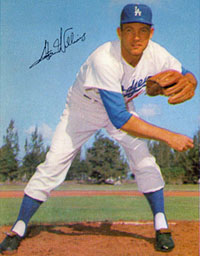
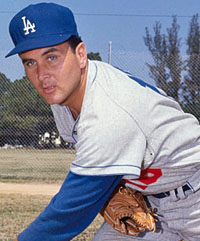
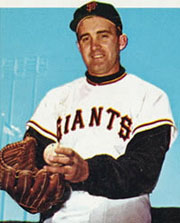










 Orlando Cepeda
Orlando Cepeda












